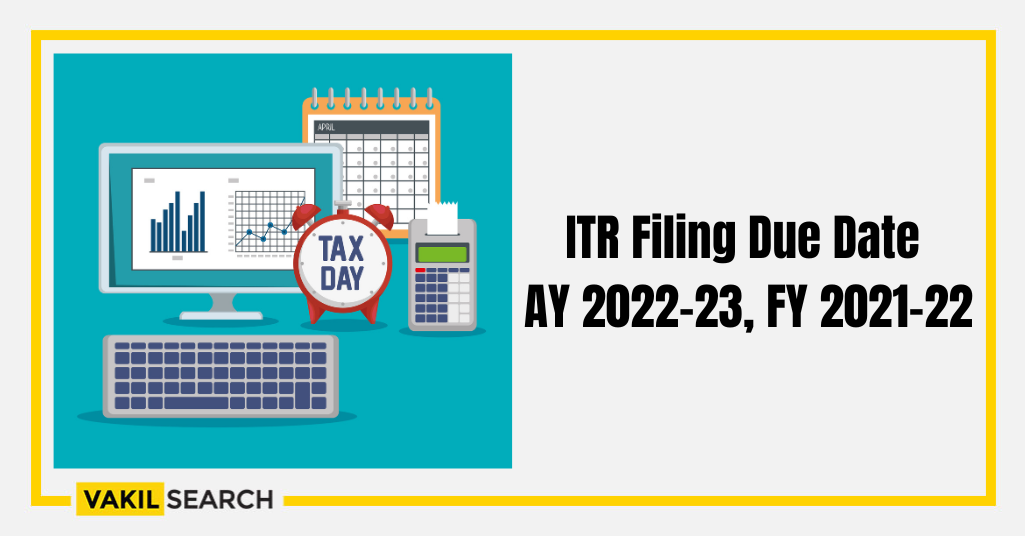Go through the article and file your taxes on time, and know the last day to file ITR Filing Last date. The taxes make the nation grow, so this is a legal liability to file your tax returns in time. Delay in tax returns can cause some trouble.
Introduction
Income tax is one of the significant sources of a country’s tax revenue, which contributes to the government executing welfare works for its citizens.ITR Filing Last date It is also called direct tax because people who earn a taxable income pay their taxes directly to the government of the State. Income tax is imposed by the government, making it your legal obligation to pay before ITR Filing Due Date.
Income tax can be imposed on individuals, companies, firms, local authorities, Hindu Undivided Families, and LLP. Every year during the lunch of the new budget, some rules and slabs related to income tax get released. These rules are released in the financial year and applied in the subsequent assessment year. Every taxpayer must follow these rules before filing their income tax returns (ITRs).
Income Tax Return
The Income tax return is a form that contains data about the income of a person and how much is taxable or exempted from paying tax. The amount of tax a person will pay is decided by the slabs released in the financial year. The Income-tax rates are released annually, but the income tax is paid on a monthly basis.
If a person miscalculates the taxable income amount and pays excess tax to the Income Tax Department during a year, he will get a refund of the extra payment from the income tax department.
Income tax transactions are made under provisions of income tax law that are prevalent in India. The Income-tax return has to be done every year by the individuals or corporations. If you missed the ITR filing due date period, liabilities and penalties can be attracted.
Discover the Seamless Power of Online Bookkeeping – Empowering Your Business With Real-Time Insights and Financial Clarity, All at Your Fingertips.
ITR Filing Due Date for FY 2021-22(AY 2022-23)
Paying Income tax is a legal obligation that must be done by all citizens who come under the ambit of taxable income according to the income tax slabs. If income tax is not paid within a certain period, default penalties can arise. So to ensure the filing of income tax does not attract any penalty, You should file Income Tax within the ITR filing Due Date.
Section 234 A and 234 F of the income tax Act deal with penalty provisions. Income tax return filing is done after the financial year and within the assessment year.
- A salary-earning individual or a Hindu undivided family can file their income tax return within 31 July 2022.
- The due date for a business requiring an audit will be 31 October 2022.
- Similarly, a business requiring a TP report shall file an income tax return before 30 November 2022.
The central government has the discretion to extend the due dates.
Who Should File ITR?
According to the new income tax slabs and income tax rates, every person who is a citizen of India can file an income tax return irrespective of their age.
- So, all citizens are entitled to file an Income tax return according to their annual income.
- An NRI can also file tax if his annual income is more than 2.5 lakhs. Less than 2.5 lakhs yearly income is exempted from taxation liabilities.
- All registered companies are liable for paying income tax returns irrespective of whether they have gained any profit or not.
- Foreign companies established inside India are liable for paying income tax returns.
- If a person owns any tangible or intangible assets outside the country, he is liable to pay taxes.
What Happens if You Miss the ITR Filing Deadline?
If you miss the Income Tax Return (ITR) filing deadline, several consequences can arise:
- Penalties: The most immediate consequence is a penalty. Depending on your total income and the delay, you could face penalties under Section 234F. The penalty can range from Rs. 1,000 to Rs. 5,000 or even more, depending on the delay and your income.
- Loss of Refunds: Filing late can result in the loss of any potential refunds. Even if you’re eligible for a refund, the delay might cause unnecessary complications.
- Carry Forward Losses: If you have incurred losses that you want to carry forward, filing the return on time is crucial. Late filing could result in losing the ability to carry forward these losses to offset against future income.
- Interest on Tax Due: If you owe any tax, you might be liable to pay interest on the amount due, calculated from the original due date.
- Non-Compliance: Consistent failure to file returns can lead to non-compliance issues, which could attract further scrutiny from tax authorities.
- Limited Time for Rectification: Filing on time allows you sufficient time for rectification in case of any errors or discrepancies in your return.
Precision meets simplicity in tax planning. Use our New Tax Regime Calculator for accurate results.
What Is the Interest and Penalty for Delay in Filing Returns?
Section: 234F: Late filing of ITR
Total Income > Rs. 5 Lakhs: Penalty – Rs. 5,000
Other Cases: Penalty – Rs. 1,000
Interest – 1% per month/part month on unpaid tax under Section 234A if filed after due date.
Sections: 234E, 271H: Late TDS Return Filing
Fee: Rs. 200 per day from due date to filing, not exceeding TDS amount.
Penalty: Minimum Rs. 10,000, maximum Rs. 1,00,000.
Note – No penalty is levied if TDS return is filed within one year from due date.
ITR filing for Limited Liability Partnership (LLP) for FY 2022-23
For LLPs (Limited Liability Partnerships), the due dates for Income Tax Return (ITR) filing for FY 2022-23 (AY 2023-24) are as follows:
LLPs Not Requiring Audit: The ITR filing due date is 31st July 2023.
LLPs Requiring Audit: The ITR filing due date is 31st October 2023, and the Tax Audit Report filing due date is 30th September 2023.
Ensure compliance with these due dates to avoid penalties and ensure a smooth tax filing process.
What are the Benefits of Filling ITR under Due Date?
Filing your ITR by the due date offers several benefits, including:
Avoiding Penalties: Filing your ITR by the due date helps you avoid penalties and interest charges for late filing or payment.
Timely Refunds: Filing your ITR by the due date ensures that any refunds due to you are processed in a timely manner.
Compliance: Filing your ITR by the due date helps you comply with the Income Tax Department’s regulations and avoid any legal consequences.
Consequences of Missed Income Tax Return Due Date
If you miss the ITR filing deadline, you may face the following consequences:
Penalty: The Income Tax Department may impose a penalty of up to Rs. 5,000 for late filing of ITR. The penalty amount may vary depending on the delay in filing the ITR.
Interest: If you fail to file your ITR by the deadline, you may be liable to pay interest on the tax amount due.
Prosecution: In certain cases, the Income Tax Department may initiate prosecution proceedings against taxpayers who fail to file their ITR by the deadline.
Interest and Penalty for Delay in Filing Income Tax Returns
If, for any reason, you have not filed income tax returns within the due dates and that are not pre-specified can attract penalties. The penalty for not filing income tax within the due date is discussed under section 234A of the Income-tax Act.
If a person does not file ITR in time, he would be liable for paying the amount at the rate of 1% interest for every month.
Due Dates for Making Payment of Advance Tax Installments
Income tax must be paid within a specific date. If the tax is not paid beforehand, it can put you in a situation where you have to face unnecessary liabilities and penalties. So it’s better to spend your tax before the end of the financial year.
Paying taxes in advance means paying taxes on the year’s income in which the payment has been made. Individuals must calculate their estimated income and taxable price and deliver it within the four installments provided during the financial year.
Taxpayers must pay their annual tax by estimating the income and delivering it in installments. These installments are 15 percent, 45 percent, 75 percent, and 100 percent. The payment must be made on or before 15 June, 15 September, 15 December, and 15 March. By this, a study flow can be maintained of the income tax because of the tax payments made at the same time as income. So the recent due date of 2022 is 15 June 2022.
The Due Date for Filing a TDS Return
TDS or Tax Deducted at Source is a type of income tax collected for a purpose that when a person is liable to make a payment to another person, he shall deduct tax at source. The central government shall be remitted about it.
The due dates for filing TDS for the financial year 2022-2023 are:
| Quarter months ending | Month of deduction | Due dates of payment of TDS | Due dates for filing TDS |
| 30 June | This quarter contains April, May, June | 7 May, June, July | 31 July 2022 |
| 30 September | This quarter contains July, August, September | 7 August, September, October | 31 October 2022 |
| 31 December | This quarter contains October, November, December | 7 November, December and January | 31 January 2023 |
| 31 March | This quarter contains January, February, March | 7 February, March, and April, and 30 April for other deductors | 31 May 2023 |
Interest and Penalty for Delay in Filing TDS Returns
If a person who is liable to pay TDS does not pay it within the due dates will be fined 200 rupees for each day unless he files the scheduled payment.
Conclusion
Being aware of the ITR filing due date for AY 2022-23, FY 2021-22 is essential for individuals and businesses. Income tax is one of the significant sources of tax: https://www.tax.ny.gov/ revenue for a country so contribute to the positive growth of the nation by paying your taxes as a responsible citizen.
Read More,
- How to File Income Tax Return After the Due Date?
- ITR Filing Last Date Fy 2023-24 (Ay 2024-25) – ITR Due Date
- What Is the Penalty for Not Filing ITR?
FAQs
What is the last date to file ITR 2022-23 status?
The last date to file ITR for the financial year 2022-23 for individuals or businesses not requiring audit was July 31, 2023.
Is there any extension of ITR filing date?
As of August 2023, there has been no extension of the ITR filing date for the financial year 2022-23.
How do I file a return after the due date?
If you miss the ITR filing deadline, you can file a belated return within the specified timeframe. The belated return can be filed using the Income Tax Department's e-filing portal.
How do I pay my ITR late fee?
The ITR late fee can be paid using the Income Tax Department's e-filing portal or through authorized banks.
What is the last date for ITR filing 2023?
The last date for ITR filing for the financial year 2023-24 has not been announced yet.
What is the filing date for ITR 2023?
The due date for filing Income Tax Return (ITR) for FY 2022-23 (AY 2023-24) is 31st July 2023 without incurring a late fee.
What is the last date for ITR extension 2023?
The extended deadline for submitting the ITR-7 for AY 2023-24 is November 30, 2023, moved from the original deadline of October 31, 2023.
Will the ITR filing date be extended?
The filing date for ITR 2023 has been extended by the Central Board of Direct Taxes (CBDT) to October 31, 2023, and further to November 30, 2023.
Can I file my ITR after 31 July?
If you miss the July 31 ITR deadline, you can still file a belated return until December 31, but a late filing fee and 1% penal interest per month will be levied.
What is the late fee for ITR after 31 July 2023?
For income above ₹ 5 lakh, the late fee for missing the deadline is ₹ 5,000; for income below ₹ 5 lakh, it's ₹ 1,000.
What happens if ITR is not filed before 31st July?
Failure to file ITR by July 31 leads to a liability of paying simple interest under Section 234A of the Income Tax Act at the rate of 1 percent for every month or part of a month.
How much income is tax-free?
Budget 2023 introduced tax exemptions, making income up to ₹ 3 lakh tax-free. Income between ₹ 3 lakh and ₹ 5 lakh is taxed at 5%, while income between ₹ 6 lakh and ₹ 9 lakh is taxed at 10%.
What is the late fee for ITR filing?
Late filing of ITR incurs penalties. For income over ₹ 5 lakh, the penalty is ₹ 5,000, and for income up to this limit, it's ₹ 1,000. After December 31, 2023, the penalty increases to ₹ 10,000.
What is the penalty for not filing ITR?
Late filing attracts a penalty of ₹ 5,000 for individuals with a total income exceeding ₹ 5 lakh and ₹ 1,000 for those within this income limit.
Is it compulsory to file ITR for zero tax?
Filing a nil return is mandatory for individuals earning less than ₹ 2.5 lakh, declaring no taxes paid in the respective financial year, as per the Income Tax Act.










